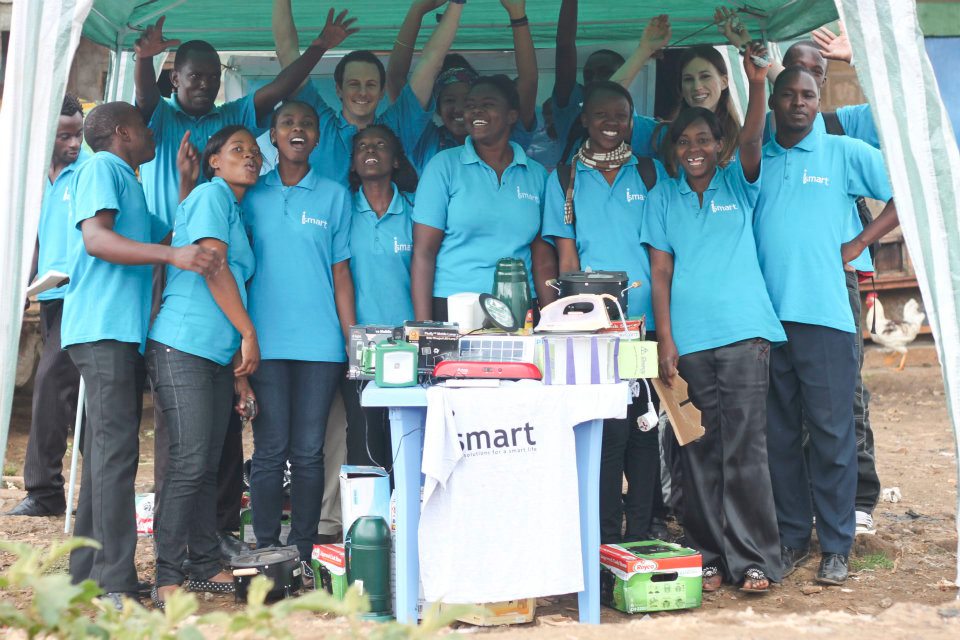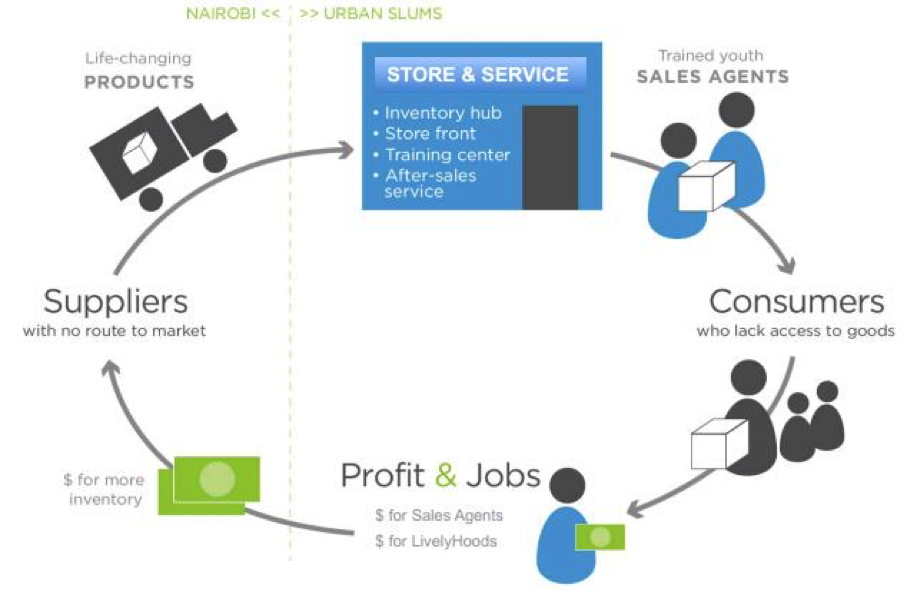Triple-Social-Mission by LivelyHoods: Jobs + Product Access + Clean Air in Kenya’s Slums
Categorized as: Africa, Girls & women, Grantee, Job Creation, Our Partners, Stories, Youth & Tagged as: Cookstoves, Environment, Nairobi, Slums, Solar power on August 13, 2016. Related Grantees: Agora Partnerships, Destiny Foundation through Cents of Relief, Freedom From Hunger, Grameen Foundation, Hope for Honduran Children, Jibu, Kiretono Resource Centre through AID Tanzania, BOMA Project, Upaya Social Ventures, Working Capital for Community Needs.

By Suzanne Skees
This story was originally published on Huffington Post. Read the original version here.
Chronic unemployment in Kenya leaves 68 percent of youth without a stable income. In the slums, young men and women struggle to find a source of income. Some youth sell their bodies, rob their neighbors, or are recruited by Al-Shabbab to launch grenades into neighborhood markets. The problem is worsening quickly as the slum population is expected to double by 2030.
Our partners at LivelyHoods train youth and women in the slums to sell clean cookstoves, solar lamps, and other products through door-to-door sales, popup sales events, and business-to-business (B2B) sales to small and informal retailers.
The LivelyHoods Model
Jobs for youth & women deliver eco-friendly products to slum families who need them most
Here’s how LivelyHoods works:
“We hire for attitude and train for skills”
LivelyHoods partners with local organizations that are not providing income-generating activities and offers services to their clientele. They provide trainees with a week-long comprehensive classroom sales and marketing training that covers a range of employable skills, followed by a week of field training with instructors and experienced sales agents.
Sales agents receive products on consignment and earn commission for each product sold. Micro-consignment borrows heavily from traditional microfinance. Instead of borrowing money to buy product, however, their youth choose which products they want to sell and only repay the cost of the product after successful sales: a low-risk alternative to microloans.
Sales agents are also offered ongoing and refresher trainings to stimulate growth and learning. These trainings vary in topic ranging from ethical decision-making to closing deals.
How LivelyHoods Works
Triple-mission impact
So far, LivelyHoods has trained over 2,000 youth and created over 900 jobs,generating over $115K in income for their sales agents. LivelyHoods estimates that the 14,000 cookstoves and 1,700 solar lamps sold through their network have prevented 175,000 tons of carbon emission–the equivalent of taking 36,000 cars off the Nairobi roads.
From Street Boy to Sales Trainer: Alex Thrives at Work
 In a self-directed portrait, Alex remembers life on the streets, where he once survived by collecting metal scraps.
In a self-directed portrait, Alex remembers life on the streets, where he once survived by collecting metal scraps.
You can’t imagine how hard it was to live in the streets
My name is Alex Beru. Before I joined LivelyHoods as a sales agent–you can’t imagine. It was hard for me to get food there in the streets. We were collecting scraps to get food, snatching anything. But now I can earn money, through working hard, selling products to the community. Now we’re selling things that bring impact to the lives of people living in the community.
When I was living in the street, life was really hard. I used to collect scraps for money. I felt isolated because people think negatively about street boys and ignore them . . . Even the dogs would bark at me. Because everybody thought we [street boys] were bad people, we didn’t have opportunities to work and earn a living; and so we ended up engaging in criminal activities like pick-pocketing, gambling, and stealing.
Rehab centers and orphanages don’t really change outcomes
I was in many organizations – rehab centers [rehabilitation centers for street kids], orphanages, that would try to help us by giving us food and clothing and offering showers, but nothing was working for me. At the end of the day, we would just go back to sleep in the street and we wouldn’t be any better off than before. It is like the saying “You give a man a fish, you feed him for a day; but teach a man to fish, and you feed him for a lifetime.”
Our program trains youth in entrepreneurship and then gives them a loan to start their own businesses. While I was attending that training, I explained that we [the youth] wanted to have more experience in business before taking on a loan and possibly going into debt trying to start our own business. After that, we decided to change the program. I helped survey the community and ask what products they were using at home and what products they would like to have. Many people that we talked with said that they wanted electricity, so from that survey we decided to sell solar lamps in the slums.
Now, people can’t imagine I used to live in the street
Now, I’m the Recruitment and Training Manager. A lot of people in the community can’t imagine that I used to live in the street. They see a big change and how LivelyHoods has really changed my life. I’m happy because I’m trying to imagine how we’ll grow big in the years to come because our aim is to reach many youth on the streets.
 Alex plans to help lead LivelyHoods’ micro-consignment business model across Kenya and beyond.
Alex plans to help lead LivelyHoods’ micro-consignment business model across Kenya and beyond.
This job made me discover myself and made me into the man I am today. I started selling LivelyHoods products and interacting with people in a positive way and my life changed completely. Now I am respected and well-liked in the community. I have learned how to save money and I’m building a house for myself.
Looking to the future
Photographs, graphic, and video courtesy of LivelyHoods.
LEARN more about creating jobs for Kenyan youth here.
SHARE this story with your networks; see menu at top and bottom of page.
DONATE directly to create a job at LivelyHoods, here.
SUBSCRIBE! Like what you see? Click here to subscribe to Seeds of Hope!

